Meet Valentina Plazas and Maximiliano Fernandez, aka Black Widow and Captain Latin America
January 18, 2023
By Anna Kellar
Photo © Anna Kellar, Melanie Heaney/U.S. Figure Skating, Jay Adeff/U.S. Figure Skating
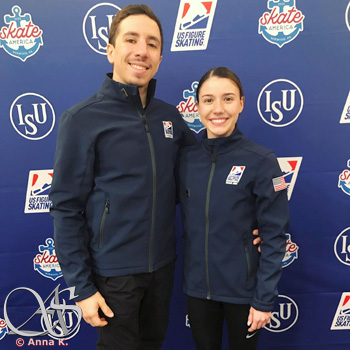 The post-Olympic season is a great time for new pair teams to make their mark on the international stage. The US pair team of Valentina Plazas and Maximiliano Fernandez are emerging talents who are eager to improve on their sixth-place finish at last year's US Nationals. Both Valentina and Max were relative late comers to skating, starting at ages 12 and 13, respectively. Max was the 2016 US Junior Champion with his previous partner, while Valentina switched to pairs in 2020. I spoke to the team after the first practices at Skate America, their Grand Prix debut.
The post-Olympic season is a great time for new pair teams to make their mark on the international stage. The US pair team of Valentina Plazas and Maximiliano Fernandez are emerging talents who are eager to improve on their sixth-place finish at last year's US Nationals. Both Valentina and Max were relative late comers to skating, starting at ages 12 and 13, respectively. Max was the 2016 US Junior Champion with his previous partner, while Valentina switched to pairs in 2020. I spoke to the team after the first practices at Skate America, their Grand Prix debut.
How are you feeling about being here at Skate America?
Valentina: We're excited. We're happy to be here and just taking it in, being in the moment. Before we left for here, we also found out that we got assigned to Skate Canada next week.
Max: We're just treating the Grand Prix like any other event or competition. We've already competed five times in the last month, eight times total this season.
I was going to ask what you've been working on since US Classic, but maybe you've just been competing!
Max: We've just been surviving.
Valentina: We've been cruising! We're excited for after Skate Canada, to be able to branch out and work on stuff, instead of just maintaining.
Was it your strategy this year to do so many competitions?
Valentina: We weren't really expecting to have a Grand Prix. So, it's all very exciting.
Max: 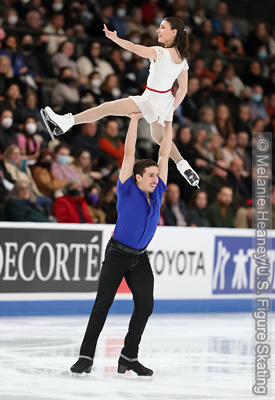 It's good because it's going to give us points for world standing, and the more points, the better. You never know what the selections are going to be for international competitions, because there aren't that many teams. And the World Champions are Americans, so they've opened three spots [for Worlds]. It's about fighting for that third spot, or even getting second place, or maybe going to Four Continents. Getting ready for that part of the season.
It's good because it's going to give us points for world standing, and the more points, the better. You never know what the selections are going to be for international competitions, because there aren't that many teams. And the World Champions are Americans, so they've opened three spots [for Worlds]. It's about fighting for that third spot, or even getting second place, or maybe going to Four Continents. Getting ready for that part of the season.
It sounds like you have big goals for this season.
Max: We always try to think a little bit ahead of the plan – but not too far out.
Your coaches Jim Petersen and Amanda Evora recently moved your training center to Michigan from Florida. How do you like that new environment?
Valentina: It's been amazing honestly, the management and all the coaches there. We have Aaron Stickel as our off-ice trainer. It's such a great facility, and it's good to have dedicated pair ice and more people to work with. It's been great to have a team with Amanda, Jim, and Lisa. We've been able to grow a lot.
Max: And the skating director, who is also one of our coaches, Lisa Kirby, she's great. We're right across from the Michigan Ice Dance Academy too, we train on the other rink in the center.
Have you been able to share any training with the ice dancers?
Valentina: We did some stroking classes with them during the summer. But unfortunately, right now our schedules are very different. We've been competing and so have they. It's nice to just watch them, how they move. You learn so much.
Max: It helps us with the second mark. Well, Jim is already very involved with that second mark, his past teams have been well known for that. Seeing the charisma that the dancers have on the ice inspires us to go out there and give Jim that same charisma and bring it to events like this.
I wanted to ask about your programs. Your Marvel free skate is very fun. Do you play the characters from the movies?
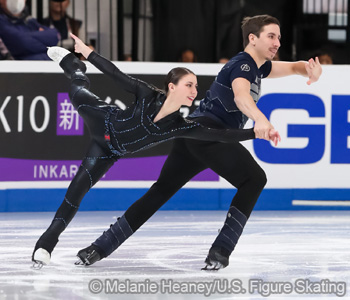 Max: I'm Captain America – I always joke around, I'm like Captain Latin America!
– and she's Black Widow. In our own minds, we're like our own different universe version of those people.
Max: I'm Captain America – I always joke around, I'm like Captain Latin America!
– and she's Black Widow. In our own minds, we're like our own different universe version of those people.
Valentina: I think it's good because there's no romantic storyline there. So, it was really left to our own interpretation. We're trying to play the characters and letting the audience fill in the story. I don't think many people have done Marvel programs, so, it's fresh.
Your team is unusual in figure skating in that you're both Hispanic skaters. Has that part of your identity impacted your experience as skaters or your development as a team?
Valentina: Definitely. It's been a big part lately, because we've been able to talk about it and get more recognition for being Hispanic. It's been nice, and I think it's the right time to talk about it, especially with our short program to ‟Maria.” I moved to the United States when I was six (from Colombia – ed.), so I have a connection to that story. It has played out perfectly.
Max: Both my parents are immigrants (from Peru and Cuba – ed.), and then she's an immigrant and her parents and family are immigrants, but we're all U.S. citizens. It's nice to be recognized in the skating community as Latin Americans or Hispanic Americans.
I really love your short program. We've seen a lot of people skate to ‟Maria”, it works well as a pair program. What was the process like for you doing choreography this year?
Max: It was easier than our first two programs. We did a jazz program for juniors and then we did the ballet (‟Sleeping Beauty Wedding Pas de Deux” by Tchaikovsky – ed.) last year. So going into it with a Hispanic character, you get to play yourself almost, while presenting that image of Tony and portraying the angst of the romance with a Hispanic character.
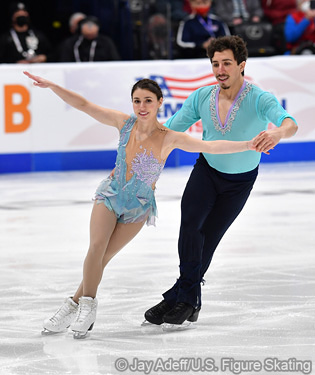 Valentina: I think choreography this year was a lot easier because we know our team better. We're not new to pairs. We know our patterns; we know where elements need to be put.
Valentina: I think choreography this year was a lot easier because we know our team better. We're not new to pairs. We know our patterns; we know where elements need to be put.
For each of your programs, do you have a favorite part, or a moment that you want people to look forward to?
Max: We both like our lifts, lifts are probably our strongest elements. We take it for granted how good our lifts are, as we probably did the hardest lifts in the competition.
Why do you think that is? You are a fairly new team, and Valentina, you're relatively new to pairs, so how did you get to be so good at lifts?
Max: I've been skating pairs for a long time, and then I taught Valentina for the first six months before we went to Jim and Amanda. We were in Miami together, before we went up to Tampa, where they were training at the time. When we moved up there, we worked hard on lifts with them, to make them more difficult and different than everybody else's.
Valentina: During the pandemic, we had to be off the ice for a while, so we did lifts all day long. I'm pretty comfortable up there. If they ask me to do anything, I will. I like lifts.
Max: And twisting is easy for us. It's another highlight for sure.
I really like the carry feature that you have in your final lift in the free skate. That creates such a moment.
Max: That one is actually Amanda and Mark's (Ladwig) old lift, Jim's old team, from before she became his coaching partner. We would like to say it's a lift from our school, that they brought over. We're part of the new school and the new leaders. So, we're doing that lift and we try to do it even better than them.
 How does that feel for you to be in an environment where you are in that top spot?
How does that feel for you to be in an environment where you are in that top spot?
Valentina: It's nice. We have another senior team that trains with us too, and they just got together five months ago. It's nice to inspire them and to watch and remember that I was in her shoes, because she's also learning pairs. Even the novice team that we have, it's nice to see that process. We always have to be good role models for them, work hard, and show that you do have to put in the work.
Max: Because work is definitely needed! And then it's easy.
Those first stages of switching disciplines must feel like a huge change, with so many new things to learn all at once.
Valentina: It was honestly hard. As a singles skater, you just work on jumps, spins or footwork. Here, it's twist, lifts, throw, pair spin, death spiral, it's so much, you kind of forget how to jump for a while.
Max: There is much more to skating than just jumping and spinning and at that point, it opens a whole new world. The first few months, your body was just dying!
Valentina: It's a lot, but it's good. Last season was our developmental season. This season is more about consistency and finding what works for us. I think looking toward next season, it will be more about expressing ourselves, and a focus on the second mark once we're comfortable with the elements.
With so much turnover in the pairs field right now and fewer teams competing, there's been a lot of conversation about how to grow this discipline. What would you say we should be doing to encourage more people to do pairs?
Valentina: This year for Pairs Camp, it was good that there were a couple of new girls – but there are so many girls, and you don't see as many boys. U.S. Figure Skating should be telling the boys: ‟Hey, here's your opportunity for pairs!” There are so many boys in juvenile, so get them started early. People think that pairs is for older people but the earlier they start, the easier it is.
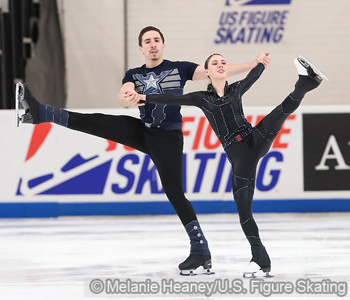 Max: Yeah, starting young, but also promoting coaches is important. Because a lot of people know just the couple of top schools, but a lot of people don't know about Jim and Amanda. I think we're very under the radar, which is sometimes okay, but sometimes it's needed to have a little bit of exposure [to inspire new skaters]. When I took [Valentina] to Jim and Amanda, I told her it was going to be the exposure she needed, since I've been a student of theirs' for almost ten years now. It helped to get her motivated to do it. When I first started, too, I wanted to do pairs, but my coach said that you had to be a good singles skater to be a good pair skater. I worked so hard to be a good singles skater. I never really saw pairs unless I went to a couple of competitions where I saw Jim's teams skating. But then I went to his training school, and I saw him working with his past students. You just stand there in awe…
Max: Yeah, starting young, but also promoting coaches is important. Because a lot of people know just the couple of top schools, but a lot of people don't know about Jim and Amanda. I think we're very under the radar, which is sometimes okay, but sometimes it's needed to have a little bit of exposure [to inspire new skaters]. When I took [Valentina] to Jim and Amanda, I told her it was going to be the exposure she needed, since I've been a student of theirs' for almost ten years now. It helped to get her motivated to do it. When I first started, too, I wanted to do pairs, but my coach said that you had to be a good singles skater to be a good pair skater. I worked so hard to be a good singles skater. I never really saw pairs unless I went to a couple of competitions where I saw Jim's teams skating. But then I went to his training school, and I saw him working with his past students. You just stand there in awe…
Valentina: Also in the media, they could be showing more pairs. You'll see a lot of women and men and ice dance, but there's also a fourth discipline that's not really talked about as much. I know we have fewer teams now, but there are up-and-coming teams they can show.
Max: It's very disappointing to see what's happened with Alexa and Brandon's (Knierim/Frazier) exposure after winning Worlds and not being able to expose them to the normal ABC, NBC media circuit, like going on Jimmy Fallon… that kind of promotional boost. [As an American pair winning Worlds] they did something that hasn't happened in almost 40 years, you know? So, what the heck, man? It's not just the Olympics that matter… I'd like to see skating talked about like it was in the ‛90s and early 2000s.
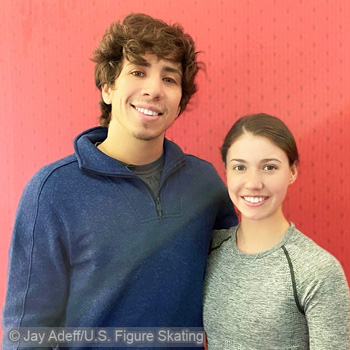 Those are important points. I've heard from other pair skaters that a shortage of coaches is also one of the obstacles to growing the sport.
Those are important points. I've heard from other pair skaters that a shortage of coaches is also one of the obstacles to growing the sport.
Max: [Valentina] is going into criminal justice, she's about to graduate in December. And then, once I'm done, I still have aviation and drones to fall back on. But I'd like to keep the tradition of excellence that Amanda and Jim always preach about and keep on teaching it. I feel like I've learned so much and have a passion for pairs. So why not keep teaching it?
The strain of so many competitions in a row may have impacted Valentina and Max, who struggled with their side-by-side jumps and throws at Skate America, finishing in sixth place. One week later at Skate Canada, they improved their total competition score by nearly 20 points and finished 5th. In the mixed zone at Skate Canada, Max shared: ‟Our coach tells us each competition is a month”s worth of training.” We hope the team can incorporate all that experience, get some rest, and move toward their goal of a top three position at US Nationals.



